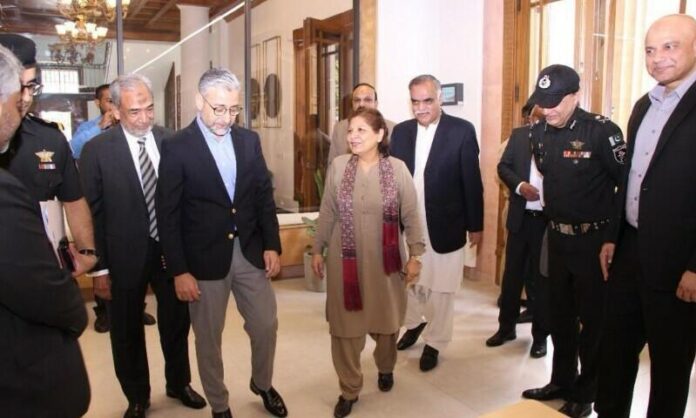Caretaker Finance Minister Dr. Shamshad Akhtar has unveiled a series of comprehensive reforms aimed at revitalizing Pakistan’s economy. These initiatives, she emphasized, are not solely intended to meet the upcoming International Monetary Fund (IMF) review’s requirements but are designed to usher in long-term benefits for the nation.
During a meeting with representatives from the Korangi Association of Trade and Industry, Dr. Akhtar revealed that the IMF program’s implementation had progressed steadily in the first quarter of the current fiscal year. This announcement comes just four days before the official review of Pakistan’s $3 billion Standby Arrangement with the IMF.
Dr. Akhtar, accompanied by the Chairman of the Federal Board of Revenue and other senior tax officials, highlighted that the IMF team is scheduled to arrive in Pakistan on November 2. She underscored Pakistan’s achievement in meeting all agreed-upon targets for the first quarter of FY24 and successfully putting into action all proposed measures.
However, Dr. Akhtar stressed that the caretaker government’s actions extend beyond the IMF’s requirements. She explained that these measures are crucial for securing funds from other multilateral institutions, which are expected to follow shortly after the IMF review.
The government has accelerated the execution of reforms recommended by the IMF and the World Bank across various initiatives. Additionally, they have finalized an economic revival program, which will soon be made available on the ministry’s website. The program’s essence is to foster sustainable growth led by the private sector.
Key components of the government’s strategic plan to strengthen the nation’s economy include implementing national credit schemes for small and medium enterprises and establishing an export-import bank.
Regarding the Federal Board of Revenue’s (FBR) performance, Dr. Akhtar highlighted that tax collection in the first quarter exceeded the IMF’s target. She also emphasized the government’s efforts to reform state-owned enterprises.
Dr. Akhtar expressed confidence in the rapid improvement of Pakistan’s economic situation, noting significant growth in various sectors during the first quarter, indicating a robust resurgence in economic activities. She commended law enforcement agencies for their effective crackdown on illegal currency smuggling, misuse, and hoarding within the country and along its border regions.
In terms of inflation, Dr. Akhtar mentioned that it is on a downward trajectory. However, she cautioned that inflation could resurface due to external factors such as rising commodity prices. Dr. Akhtar disclosed that electricity and gas prices have been adjusted to reflect market rates and will continue to be revised in accordance with market fluctuations.
In a global context, Dr. Akhtar will participate in a regional gathering of ministers, policymakers, and experts in Bangkok on November 1. The purpose of this gathering, organized by the United Nations Regional Commission for Asia and the Pacific (UN-ESCAP), is to explore a new approach to assessing the impact of investment in Sustainable Development Goals (SDGs) on public debt sustainability. The fourth session of the Committee on Macroeconomic Policy, Poverty Reduction, and Financing for Development, taking place from November 1-3, will also gather feedback on ten proposed sustainable finance principles, encouraging governments, regulators, and financial institutions to leverage their resources for a net-zero transition.


